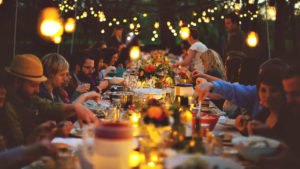Event Planning Beyond Meals. Part 3 in a series. Filling in details, particularly for the large group. Covering needs, accommodations, reservations and contracts. This serves as a guide for any large scale planning. Events are unique in ways, however, these items are common details to consider. Use what you need from the guide based on your specific event. Expand or decrease as necessary.
Starting with the W’s of Event Planning Beyond the Meals:
- What – What is the event about?
- Why – Why is it important we hold an event about our what?
- Who – Who needs this information and who would I like to share it with?
- When – When do I hold the event?
- Where – Where do I hold the event?
What is the Event About?
This must be defined clearly. Focus in on what it is you intend to have happen. Is this a wedding? A retirement party? An award ceremony? Educational opportunity? Specialty field training? Knowing what your event is about will also answer your questions for what equipment you need. Event Planning Beyond Meals requires you have these details!
Why is it Important?
It is pointless to hold an event without having intention of a desired result. What is your desired result? Do you want everyone to walk away feeling they have a tidbit more knowledge today than yesterday? How about having a good time, it’s about releasing tensions and laugh, enjoy yourself and feel a sense of balance between all work and no play. Now, I know that balance won’t arrive with one event overnight. However, one event at a time it will feel balanced. Ultimately, it will all balance.
Who Will Benefit From This Event?
Since events range from one person to thousands, this question relies on the answers for the previous two questions. To go through the arduous tasks to plan and arrange for an event to happen, somebody needs to make this all worth it.
The Individual – YOU
Take the Time to Do It
For example, arrange for yourself to spend an enchanted evening alone in a fancy hotel suite with an in-room jetted or effervescent tub. Take it a step further, set up a floral delivery for the room before you check-in. Then at check-in, hand them your favorite bottle of fine wine. Next, ask them to bring it to you chilled with a nice plate of fine wine snacks pairings. Request they bring it approximately within an hour of your arrival. Therefore, you have time to get to your assigned room, familiarize yourself with the light switches, phone directory, hotel map, and hang up or put away items from your travel bag. Then YOU relax and enjoy your time!
When It’s Not Worth the Effort
An instance where this would not all be worth it is to make these same arrangements, however, as soon as you arrive and unpack your bags, you leave the hotel and wander the city. By the time you return, the ice melts and the wine warms. The snacks are limp and unappealing. The hour is too late to run a hot bath. Your morning is filled with a breakfast meeting and you have an early flight out. Hence, an early checkout is the only answer. Well, guess what, then all the bells and whistles are beautiful upon arrival but are a waste of resources. If your intention was to have a relaxing evening with wine, chocolate and a hot bath to benefit you, your stress reliever, it didn’t happen!
The Group
An occasion here to make the point of who will benefit is an educational opportunity. Imagine a group of 50 farmers leave their farms and put work aside to attend your educational conference. On your agenda, there are sessions related to the newest technologies in farm equipment. Presentations on trending crops and weather-related issues affecting farming. Government or financial assistance for struggling farmers. Political happenings affecting trade of agricultural products. Disease occurrences for mass production centers such as cattle and chicken. These would all be highly valuable to the farmers.
Yet, you bring in the same farmers and talk about what happened during The Great Depression in the Dust Bowl years, it doesn’t pertain to them currently. Neither does it to discuss rumors about other farmers, share a bunch of trivial facts on the city where the conference is held. There is no value for the farmer to attend your conference. Therefore, not much point in you using resources or putting forth the effort to hold an event. Again, Event Planning Beyond Meals demands considerations to details. Including who is your audience/event attendees.
When to Hold the Event
Considering schedules, holidays and other events plus time to organize the event, when is a reasonable time of year to ask about venue availability? Obviously, to organize a company Holiday party, planning for a date in the weeks leading up to the event is your best option. Talking about Thanksgiving through New Year’s, there are several dates to work with when planning. For the big one, allow yourself the following two weeks as well.
Consider Alternate Dates When Event Planning Beyond Meals
Not all holiday gatherings happen prior to the special days. People have crazy, busy schedules with invites to several events during this time. As a traditionalist, I still plan mine prior. However, not all of my family can fit everything in so a few of us choose to wait until after when things have quieted down. We no longer exchange gifts anyway. Instead, a fun night of playing games, visiting, singing now and again, and we are thrilled to spend the time together.
If your event is bigger than what you can accommodate with free space available to you, then you need to research venues. Because you chose to schedule your event on a particular date does not mean the venue has availability for that date or availability with the right stuff to meet your needs.
Where do I Hold the Event
Intimate events of individuals, couples, pairs of couples or smaller groups often are able to hold events in their homes, community clubhouses, churches or offices. When the event is a dinner event or lunch event and not an all-day deal or multiple days, several restaurants offer meeting space that can be reserved in advance.
Otherwise, research the venues in the location most accessible or centrally located for everyone. If that location does not offer a facility or the type of service you need, find an area or location that will and then research your venue options in that location.
Researching Venues
Researching venues for an event with a larger group involves more than inquiring about the venue itself or the dates it is open. Your attendees expect you to have the answers to all their questions. Because you are the coordinator of the event, the heavy load is on you. To the attendee, the only job for them to do is to complete the registration form and send payment.
For traveling attendees, they are accustomed to making their own travel arrangements, often including lodging. However, when it comes to lodging, travelers like to be close to the venue and other attendees. I encourage you to take steps to reserve a group of rooms in one hotel for your traveling attendees to make reservations in the hotel of your choosing under a group name.
In researching venues, these are the main things you should ask:
Location based
What is your exact physical location?
Do they offer a map with directions for locating their facility from different directions?
What is your proximity to the airport? (Or to a specific building or area you know you will need to be – case in point, it is wise to know the location is nearby a hospital when you have ongoing medical conditions and needs. Oxygen, etc.)
Do you have parking nearby?
Is parking free of charge or validated? Valet services?
Venue based
Can you accommodate a group of ( ______________________)? (specify the number you invite; plus another 10-15% for last minute guests)
Is there disability access to your venue?
Are special permits or insurance required from us? Yes, this is common.
Is set-up and tear-down provided? Do we do our own?
Will there be security staff? A coat check?
Cost based
What are venue costs?
How do they work?
What are the service fees? Gratuities? Taxes?
Is a deposit required?
For audio-visual equipment and/or assistance, is that available through you?
Food & Beverage Based
Do you offer catering?
Is it allowable for us to bring our own food and beverages?
Will you provide tables and chairs?
When do we provide you with guest numbers for your catering staff?
Change & Cancellation Policy
What is the last day we can make changes?
Will there be penalty fees for changes and/or cancellations of parts or all of the event?
Lodging Basics
Are there nearby hotel accommodations?
Approximate distance from venue? (When the venue is providing this information, then request a direct way to contact the hotel for detailed information. The venue is NOT your best resource for this.)
Do they offer shuttle services?
Vicinity to other shopping and dining?
Can we pre-book group rooms at a discounted rate?
Lodging Extras
Continental breakfast?
What amenities are offered?
Same-day laundry service?
Room service?
Pool or Gym?
Wi-Fi connection?
Wake-up Calls?
On-site shopping? Souvenirs? Drug-store items?
Miscellaneous on Lodging
By the way, when you do set up a group room reservation account, verify how your attendees (as hotel guests) will make reservations and guarantee payment. For example, do you want to have all rooms guaranteed to your credit card or business account? You handle all reservations? All charges are submitted to you?
Typically, keynote or honored guest speakers or guests lodging plus taxes will be handled as direct billing to the business account. Verify for each honored guest whether the guest is to pay their own meals and incidentals. It is common for meals to also be included as paid. But incidentals, such as mini-bar snacks, pay-per-view programming, spa services, laundry services, photo copying/faxing, etc. are not covered. All other conference attendees contact the hotel directly, make reservations under the group name, guarantee all charges to their own personal credit card.
The Contract
The contract is binding. This means when you sign a contract you are in total agreement with everything as defined and described within the document. Sure, it is easy to discuss with the representative presenting the contract all your desires and intentions for your event. You can review, clarify and review again verbally every week. However, READ EVERY WORD of your contract. When a statement does not make sense to you, ask for clarification! It is surprising how a small technical detail in a contract can result in hundreds of extra dollars NOT planned in your event budget. You prepare everything, all the details to this point, BE DETAILED AND PREPARED WITH YOUR CONTRACTS!
In Closing, every event is different. Every crowd is unique. The more you practice and involve yourself with helping and eventually taking over for others, the better you become at event planning The more natural it is to organize all the details. It will become second nature. Soon, others will seek your advice and suggestions for their own gatherings. This has potential to also become a money producing career for you too! If you are interested in that avenue, seek out your local catering businesses and hotels and conference facilities for career opportunities.
ENJOY YOUR NEXT EVENT PLANNING BEYOND MEALS!
EVENT PLANNING SERIES and RELATED ARTICLES
Next Article: Event Meal Planning for a Group #2
If you have enjoyed reading any of these articles, please register your name and email address for new articles and other updates from my website, Madhatter’s Magnificent Market.
Visit all our categories and pages of Madhatter’s Magnificent Market!
Return to the HOME PAGE to decide which category to shop next!




